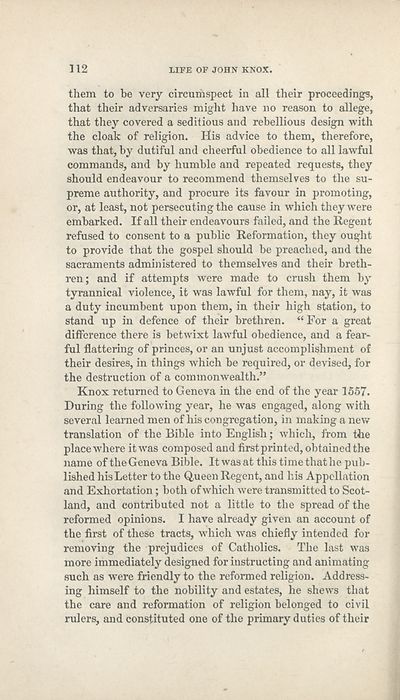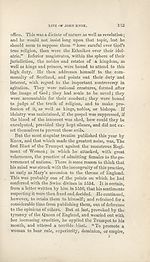Download files
Complete book:
Individual page:
Thumbnail gallery: Grid view | List view

112
OF JOHN KNOX.
them to be very circumspect in all their proceedings,
that their adversaries might have no reason to allege,
that they covered a seditious and rebellious design with
the cloak of religion. His advice to them, therefore,
was that, by dutiful and cheerful obedience to all lawful
commands, and by humble and repeated requests, they
should endeavour to recommend themselves to the su¬
preme authority, and procure its favour in promoting,
or, at least, not persecuting the cause in which they were
embarked. If all their endeavours failed, and the Regent
refused to consent to a public Reformation, they ought
to provide that the gospel should be preached, and the
sacraments administered to themselves and their breth¬
ren; and if attempts were made to crush them by
tyrannical violence, it was lawful for them, nay, it was
a duty incumbent upon them, in their high station, to
stand up in defence of their brethren. “For a great
difference there is betwixt lawful obedience, and a fear¬
ful flattering of princes, or an unjust accomplishment of
their desires, in things which be required, or devised, for
the destruction of a commonwealth.”
Knox returned to Geneva in the end of the year 1557.
During the following year, he was engaged, along with
several learned men of his congregation, in making a new
translation of the Bible into English; which, from the
place where it was composed and first printed, obtained the
name of the Geneva Bible. It was at this time that he pub¬
lished his Letter to the Queen Regent, and his Appellation
and Exhortation; both of which were transmitted to Scot¬
land, and contributed not a little to the spread of the
reformed opinions. I have already given an account of
the first of these tracts, which was chiefly intended for
removing the prejudices of Catholics. The last was
more immediately designed for instructing and animating
such as were friendly to the reformed religion. Address¬
ing himself to the nobility and estates, he shews that
the care and reformation of religion belonged to civil
rulers, and constituted one of the primary duties of their
OF JOHN KNOX.
them to be very circumspect in all their proceedings,
that their adversaries might have no reason to allege,
that they covered a seditious and rebellious design with
the cloak of religion. His advice to them, therefore,
was that, by dutiful and cheerful obedience to all lawful
commands, and by humble and repeated requests, they
should endeavour to recommend themselves to the su¬
preme authority, and procure its favour in promoting,
or, at least, not persecuting the cause in which they were
embarked. If all their endeavours failed, and the Regent
refused to consent to a public Reformation, they ought
to provide that the gospel should be preached, and the
sacraments administered to themselves and their breth¬
ren; and if attempts were made to crush them by
tyrannical violence, it was lawful for them, nay, it was
a duty incumbent upon them, in their high station, to
stand up in defence of their brethren. “For a great
difference there is betwixt lawful obedience, and a fear¬
ful flattering of princes, or an unjust accomplishment of
their desires, in things which be required, or devised, for
the destruction of a commonwealth.”
Knox returned to Geneva in the end of the year 1557.
During the following year, he was engaged, along with
several learned men of his congregation, in making a new
translation of the Bible into English; which, from the
place where it was composed and first printed, obtained the
name of the Geneva Bible. It was at this time that he pub¬
lished his Letter to the Queen Regent, and his Appellation
and Exhortation; both of which were transmitted to Scot¬
land, and contributed not a little to the spread of the
reformed opinions. I have already given an account of
the first of these tracts, which was chiefly intended for
removing the prejudices of Catholics. The last was
more immediately designed for instructing and animating
such as were friendly to the reformed religion. Address¬
ing himself to the nobility and estates, he shews that
the care and reformation of religion belonged to civil
rulers, and constituted one of the primary duties of their
Set display mode to:
![]() Universal Viewer |
Universal Viewer | ![]() Mirador |
Large image | Transcription
Mirador |
Large image | Transcription
| Antiquarian books of Scotland > Scotland/Scots > Life of John Knox ; and, The life of Alexander Henderson > (130) |
|---|
| Permanent URL | https://digital.nls.uk/131833864 |
|---|
| Description | Thousands of printed books from the Antiquarian Books of Scotland collection which dates from 1641 to the 1980s. The collection consists of 14,800 books which were published in Scotland or have a Scottish connection, e.g. through the author, printer or owner. Subjects covered include sport, education, diseases, adventure, occupations, Jacobites, politics and religion. Among the 29 languages represented are English, Gaelic, Italian, French, Russian and Swedish. |
|---|

